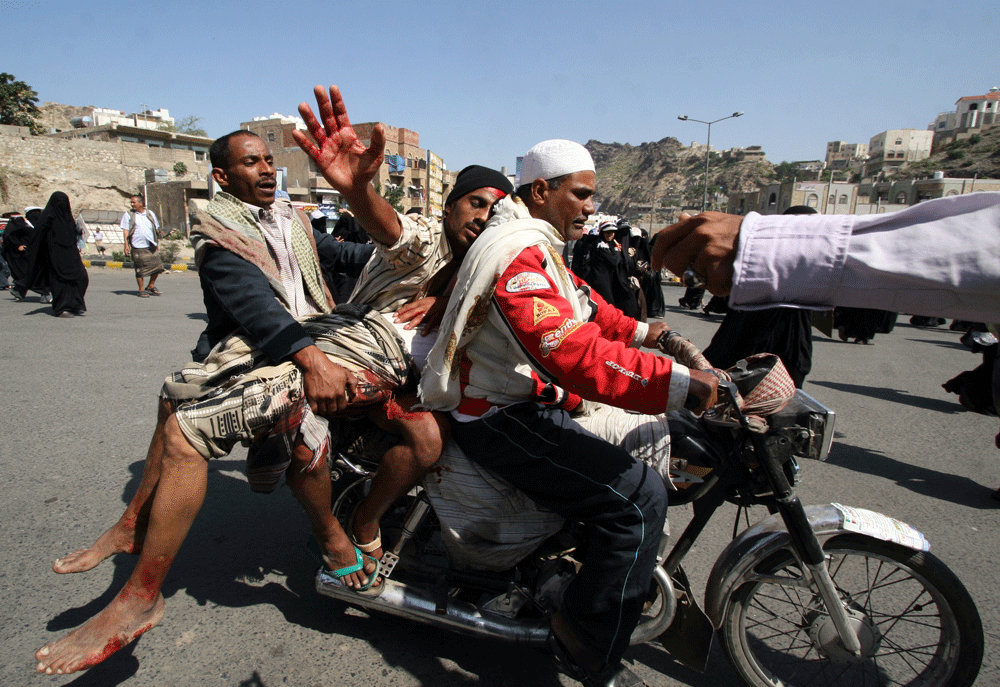Southern hostilities growing ahead of National Dialogue
In a country where American drone strikes have killed hundreds of civilians and Al Qaeda in the Arabian Peninsula roams free in many parts, it is ironic that on a recent visit to the governate of Al Dhalea in Yemen’s south that my American companion was often more welcome than I — for my own safety, I repeatedly had to hide the fact that I was from Yemen’s north.
Al Dhalea can effectively be considered the capital of the southern secessionist movement, and last month there we heard of northerners being attacked and beaten, their stores being burned or forced to close and them fleeing for their lives. Blind hate for the north was a near-palpable, collective social psychosis.
Yemen’s north and south have long held mutual animosities — helped in no small part by the 1994 civil war which the north won — but in recent months anti-northern sentiments in the south have soared. The catalyst for the recent flare in violence was government security forces opening fire on a protest in the southern city of Aden that had been organized as a counter-demonstration to a pro-government rally; dozens of southerners were killed or injured, public anger spread around the southern governates and the southern separatist movement called for civil disobedience, resulting in most public agencies and private business going on strike.
While the attacks against northerners were not systematically organized by the southern movement, it is precisely the uncontrollable, spontaneous nature of the violence and the common availability of weapons in Yemen which makes the incident frightening. More importantly, some actors allied with the southern movement spoke publicly about “the right of southerners to defend themselves” — a dangerous and irresponsible statement that was later condemned by the majority of the movement’s leaders, but it is not at all clear how long these cooler heads will prevail.
In and around Al Dhalea people speak about their local geography in terms of areas that are “liberated” and “not yet liberated”, with the frequent military checkpoints and bases in southern governates only reinforcing the idea that the south is living under northern occupation. Armed clashes between southerners and the military are occurring with increasing frequency. Many areas are effectively independent, with local stakeholders reporting to southern leaders abroad — such as Ali Salem al-Beidh, the former vice president of South Yemen before the 1990 unification, currently living in exile in Beirut— on a daily basis, as if there were no central government in Sanaa. In these parts the upcoming National Dialogue conference, meant to lay the basis for national unity between Yemen’s many stakeholder, is relevant to no one.
Happenings in the north are only exacerbating the problem. In the post civil war period a number of northern leaders blatantly exploited the south for land and resources while leaving the region impoverished. The re-emergence of these leaders to positions of prominence in the current central government is only heightening southern distrust — it is hard to convince southerners that things have changed when former President Ali Abdullah Saleh holds rallies in the capital as if he were a candidate in the coming election, rather than a disposed dictator.
Southerners largely do not see that the ambivalence and neglect shown to them by the central government has changed much under Saleh’s successor. President Abd Rabbu Mansour Hadi’s sudden visit to Aden on February 22 and his seeming concern for southern issues may have raised the hopes of some, but these were crushed under the security forces’ continued use of excessive force and Hadi’s failure to implement change on the ground.
The south has been Yemen’s biggest political problem for many years. Protest movements began here in 1994 when military and civic leaders who were sacked demanded their jobs back, which later developed into far broader, if unorganized, movements demanding independence from the north. Some segments of the south do, however, see some form of federalism as the answer and are willing to take part in the larger transition Yemen is undergoing. Supporters of even this train of thought see the precarious situation today as decisive for what will come next for the south, and what happens in the south will inevitably impact the stability of Yemen as a whole.
Farea al-Muslimi is Executive’s Yemen correspondent








